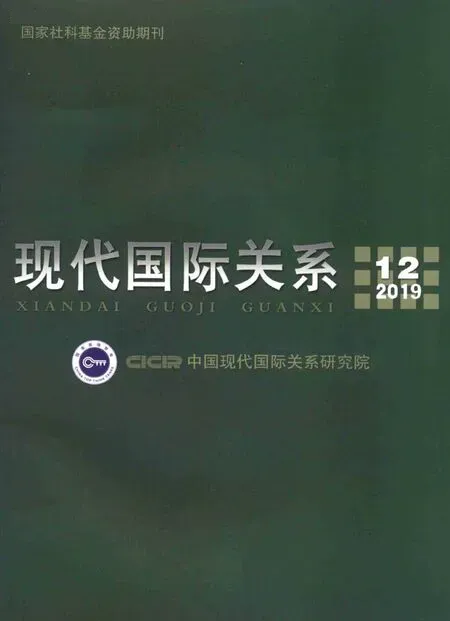Abstracts
China-JapanRelationsBackonTrack
HuangDahui
Abstract: Since the 21st century, historical and territorial issues have haunted China-Japan relations, and Japan’s logic and public opinion evolution are inherent causes of the bilateral ties’ evolution.The normalization of bilateral ties in 2018 is the result of multiple factors.Japan was more coordinative, China was positively shaping the diplomacy toward Japan and the Trump administration also played a uniqle role.In the near future, the relations will witness more improvement, but in the long run, the ties continue to be at risk due to structural contradictions.
Keywords: Sino-Japanese relations, diplomacy toward Japan, Chinese diplomacy, US factor
China-DPRKRelationsintheNewEra:Changes,MotivationandInfluence
LiChengri
Abstract: China-DPRK relations have improved significantly due to the facts that Chinese President Xi Jinping visited the DPRK last June and Kim Jong-un visited China four times.The two countries have enhanced their traditional friendship, reiterated their goal of denuclearization of the Korean Peninsula, deepened strategic communication on major issues.China and the DPRK have opened a new era of friendly cooperation.The aim for the changes of bilateral ties is to guard against war and chaos on the peninsula.It is also the result of the their respective policy adjustments.The new changes in the bilateral ties are conducive to the continuation of DPRK’s new strategies, the denuclearization of the Korean Peninsula and the integration process in Northeast Asia.China should increase its support for DPRK and keep bilateral ties on a healthy track.
Keywords: a new era, China-DPRK relations, Xi Jinping’s visit to DPRK, cooperation
China-USCybersecurityDilemmaandItsImpacts
LuChuanying
Abstract: The interaction between China and the United States in the field of cybersecurity has gradually plunged into mutual opposition which not only caused a dilemma of cybersecurity cooperation, but also had a negative impact on China-US relations.Cybersecurity has become the new frontier of China-US confrontation, and it is gradually changing the collective cognition in the US society to China, prompting policy makers to form a new concept of security against China.This situation will exist for a long time and will further aggravate confrontation and competition between the two sides.Therefore, repositioning China-US cyber relations and maintaining its stability is of great significance for the two sides to avoid conflicts, build mutual trust, and explore limited cyber cooperation.
Keywords: cybersecurity, China-US relations, cyber stability
Japan’sPoliticalSituationandItsConstitutionalAmending
HuLingyuanandKouJianqiao
Abstract: 2019 is the seventh year since Prime Minister Shinzo Abe came back to power, and the issue of constitutional amendment has been his persistent pursuit ever since.In the 25th Senate election held in July this year, Abe changed his policy of the last four national elections after 2012, deliberately making the issue of constitutional amendment an important controversial point in the election campaign, and declaring in the LDP election convention the writing of the self-defense team into the constitution.However as the election result shows, the pro-amendment power with the LDP as its core has not yet reached the two thirds of the seats required.Therefore, on one hand, the LDP led by Abe tries to reintegrate and assemble the pro-amendment forces in order to transcend the threshold, while at the same time forcing the opposition parties to step back and endeavoring to pass the “constitutional amendment” in the Diet as soon as possible and then submit to the national vote.On the other hand, they are using political resources to extensively mobilize the people in preparation for the national vote.Therefore, whether Abe can realize his political aspiration of amending the constitution during his term of office, that is, the trend of Japan’s constitutional amendment, is bound to attract the world’s attention.
Keywords: Japan’s political situation, Senate election, constitutional amending in writing, trend of constitutional amendment
SecurityRelationsbetweenJapanandTaiwanduringAbe’sSecondTerm
ZhangRuiting
Abstract: After Shinzo Abe came to power for the second time, the Japanese administration started to reinforce the relationship, especially the security relationship with Taiwan as a means to “contain” mainland China, and such effort has found its echo from Tsai Ing-wen’s administration since 2016.The two parties started by discussing non-traditional security issues and keep upgrading the “track II dialogues” as well as quasi-official communication mechanisms.Japan and Taiwan administration even secretly pushed forward their intelligence-sharing cooperation, which can be considered a sign of trying to forge a quasi-alliance among Japan, U.S.and Taiwan.However, multiple factors, such as the normalization of China-Japan relationship, the recent development of cross-strait relations and U.S.east Asia strategy, are binding a “breakthrough” of Japan-Taiwan security cooperation.As a result, the security interactions between Japan and Taiwan may go under the surface in the future, which means mainland China should be on high alert.
Keywords: Japan’s relations with Taiwan, Abe’s cabinet, Security relations

